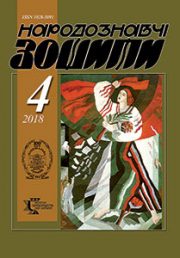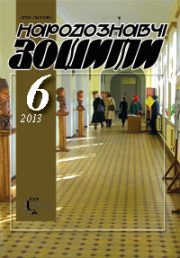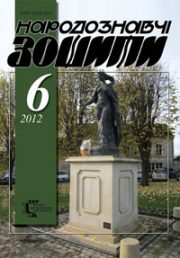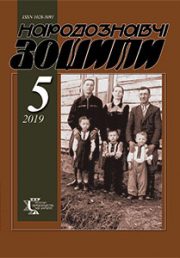The Ethnology Notebooks. 2020. № 4 (154), 923—944
UDK 398.1:81’374.2(477.41/.42)
DOI DOI https://doi.org/10.15407/nz2020.04.923
VASIANOVYCH Oleksandr
- ORCID ID: https://orcid.org/0000-0001-9360-6447
- Сandidate of History (Ph. D),
- Deputy Director of Research,
- State Scientific Center of Protection of Cultural Heritage
- from Technological Disasters,
- 21, st. Vyshgorodska, 04074, Kyiv, Ukraine,
- Contacts: e-mail: guru_v@ukr.net
Abstract. Introduction. Interest in traditional meteorological folk knowledge is caused by the applied aspect of this branch of folk culture, and by the possibilities of applying its experience in modern conditions. Under the influence of education and mass media, the population of Polissya villages is enriched with scientific knowledge, that leads to the leveling of traditional folk knowledge, beliefs and ideas. The process of folk culture decline is accelerated as a result of the Chornobyl accident. Therefore, the organization of the dictionary of terms and terminological local variants related to folk meteorological knowledge is now quite relevant.
Problem Statement. The analysis of the collected field data, which reflect not only the realities of traditional household culture, but also their terminology, led to the need to systematize the meteorological material by compiling an appropriate dictionary.
Purpose. Formation of the dictionary of folk meteorological terminology of the inhabitants of the Right-Bank Polissya based on the author’s expeditionary sources.
Methods. The methodology of publication is based on general scientific principles and basic requirements for works of historical and ethnological direction. During the formation of the dictionary, a list of folk terms and terminological concepts was compiled, their content was briefly revealed and illustrated with narratives indicating the geography of life.
Results. Field data collected during 2002—2017 in the northern districts of Volyn, Rivne, Zhytomyr, Kyiv regions and from migrants from the Chornobyl Exclusion Zone were systematized and put into scientific circulation according to the author’s questionnaire. The dictionary includes terms and terminological phrases used by the inhabitants of the Right-Bank Polissya to denote meteorological phenomena, animate / inanimate nature, calendar dates and periods that predicted the weather and harvest.
Conclusion. The material presented in the dictionary about the folk meteorological knowledge of the inhabitants of the Right-Bank Polissya testifies to their organic kinship with the all-Ukrainian and all-Slavic ones. Despite this, there are many Polissya terms in the region that are not found in other regions. The analysis of meteorological terminology showed that some meteorological phenomena are dispersed throughout the territory of the Right-Bank Polissya. Modern field data show that the functioning of traditional folk meteorological knowledge is narrowing, it is being replaced by scientific methods of weather forecasting, but the memory of the elderly continues to passively preserve this layer of folk culture, which must be recorded.
Keywords: folk knowledge, folk meteorology, dictionary, term, Right-Bank Polissya.
Received 9.06.2020
REFERENCES
- Havryliuk, N.K. (1981). Mapping the phenomena of spiritual culture: (According to the data of the maternity rites of Ukrainians). Kyiv: Naukova dumka [in Russian].
- Havryliuk, N.K. (1985). Territorial distribution in Ukraine of some ritual nominations and their Belarusian-Russian correspondences. Regional features of East-Slavic languages, literature, folklore and methods of their study (Pp. 110—112). Homel’ [in Russian].
- Havryliuk, N.K. (1989). Kyiv-Polissya version of traditional family rituals against the background of adjacent territories. Kyiv Polissya (ethnolinguistic research) (Pp. 24—38). Kyiv: Naukova dumka [in Ukrainian].
- Havryliuk, N.K. (1994). Formulas-myths about the birth of children (Before the areal characteristics in the Ukrainian Polissya and adjacent territories). Problems of modern areology (Pp. 332—339). Kyiv: Naukova dumka [in Ukrainian].
- Nesen, I.I. (2005). Wedding ritual of Central Polissya: traditional structure and relict forms (middle of the XIX — XX centuries) (Pp. 24—38). Kyiv: Tsentr zakhystu kul’turnoi spadschyny vid tekhnohennykh sytuatsij [in Ukrainian].
- Artiukh, L. (1994). Areal characteristics of funeral bread in the Ukrainian Polissya. Problems of modern areology (Pp. 318—323). Kyiv [in Ukrainian].
- Ponomar, L. (1997). Names of clothes of Western Polissya. Kyiv [in Ukrainian].
- Ponomar, L. (2015). Folk clothing of the Right-Bank Polissya of the middle of the XIX — middle of the XX century. Historical and ethnographic atlas. Dictionary. Kyiv: Byznespolyhraf; Tsentr doslidzhennia ta vidrodzhennia Volyni [in Ukrainian].
- Havryliuk, N.K., & Koval’chuk, N.A. (2013). Mapping of the phenomena of traditional calendar rituals of the districts of Rivne Polissya affected by the Chornobyl catastrophe. Report on research work Kyiv [in Ukrainian].
- Vasianovych, O.O. (2016). Geographical dissemination of folk meteorological knowledge and beliefs in Middle Polissya (based on mapping materials). Report on research work Kyiv [in Ukrainian].
- (1968). Vocabulary of Polesie. Materials for the Polesie dialect dictionary. Moskva: Nauka [in Russian].
- Lysenko, P. (1974). Dictionary of Polissya dialects. Kyiv: Naukova dumka [in Ukrainian].
- Babij, F.J. (1975). Some names of clothes in the dialects of Horyn Polissya. Linguistics studies (Pp. 56—60). Kyiv [in Ukrainian].
- Svytel’skaia, V.L. (1985). Ukrainian-Belarusian oppositions in the terminology of the funeral rite. Regional features of East-Slavic languages of literature, folklore and methods of their study (Pp. 140—142). Homel’ [in Russian].
- Nazarova, T. (1985). Linguistic atlas of Lower Pripyat. Kyiv: Naukova dumka [in Ukrainian].
- Lukinova, T.B. (1989). From archaic vocabulary. Kyiv Polissya (ethnolinguistic research) (Pp. 76—83). Kyiv: Naukova dumka [in Ukrainian].
- Yevtushok, O.M. (1993). Folk construction vocabulary of western Polissya. Rivne [in Ukrainian].
- Romaniuk, P.F. (1991). Vocabulary of the wedding ceremony of the Right-Bank Polissya (Data for the «Lexical Atlas of the Ukrainian Language»). Research in Ukrainian dialectology (Pp. 225—251). Kyiv: Naukova dumka [in Ukrainian].
- Veremijchyk, I.M. (1995). A short dictionary of agricultural, household and craft vocabulary. Traditional tools, crafts and handicrafts in Volyn (Pp. 118—220). Luts’k [in Ukrainian].
- Mojsiienko, V. (1996). From Polissya folk medical terminology. Polissya: language, culture, history (Pp. 147—151). Kyiv [in Ukrainian].
- Konobrods’ka, V. (1997). Nomination of Polissya funeral rite. Ukrainian dialectological collection (Book 3, pp. 428—458). Kyiv: Dovira [in Ukrainian].
- Hrymashevych, H. (2002). Dictionary of names of clothes and shoes of Middle Polesian and related dialects. Zhytomyr: Pivnichnoukrains’kyj dialektolohichnyj tsentr Zhytomyrs’koho derzhavnoho pedahohichnoho universytetu im. Ivana Franka [in Ukrainian].
- Konobrods’ka, V. (2007). Polissya funeral and funeral rites. Ethnolinguistic studies (Vol. 1). Zhytomyr: Polissia [in Ukrainian].
- Veremijchyk, I. (2008). Short explanatory dictionary (folk vocabulary). Luts’k: Volyns’ka oblasna drukarnia [in Ukrainian].
- Arkushyn, H. (2008). Atlas of Western Polesie faunomenies. Luts’k: Vezha [in Ukrainian].
- Arkushyn, H. (2008). Atlas of hunting vocabulary of Western Polissya. Luts’k: Vezha [in Ukrainian].
- Nykonchuk, M.V. (1979). Data for the lexical atlas of the Ukrainian language (Right Bank Polissya). Kyiv: Naukova dumka [in Ukrainian].
- Nykonchuk, M.V. (1985). Agricultural vocabulary of the Right-Bank Polissya. Kyiv: Naukova dumka [in Ukrainian].
- Nykonchuk, M.V., & Nykonchuk, O.M. (1990). Transport vocabulary of the Right Bank Polissya in the system of East-Slavic languages. Kyiv: Naukova dumka [in Ukrainian].
- Nykonchuk, M.V., & Nykonchuk, O.M. (1990). Construction vocabulary of the Right-Bank Polissya in the lexical-semantic system of East-Slavic languages. Zhytomyr: RVV oblpolihrafvydavu [in Ukrainian].
- Nykonchuk, M.V. (1994). Lexical atlas of the Right Bank Polissya. Kyiv; Zhytomyr [in Ukrainian].
- Nykonchuk, M.V., Nykonchuk, O.M., Dobrol’ozha, H.M., & Hrymashevych, H.I. (1998). Names of clothes and shoes of the Right-Bank Polissya. Zhytomyr [in Ukrainian].
- Nykonchuk, M.V., Nykonchuk, O.M., & Mojsiienko, V.M. (2001). Polissya vocabulary of folk medicine and healing magic. Zhytomyr: Polissia [in Ukrainian].
- Mohyla, O.A. (1983). Polesie regionalisms in meteorological vocabulary. Polesie and the ethnogenesis of the Slavs: Preliminary material and abstracts of the conference (Pp. 67—68). Moskva [in Russian].
- Mohyla, O.A. (1983). Carpatho-Polissya lexical-semantic parallels (on the data of meteorological vocabulary). Linguistics, 4, 61—65). Kyiv [in Ukrainian].
- Mohyla, O.A. (2008). Meteorological vocabulary of Ukrainian dialects. Kyiv: Vydavnychyj tsentr KNLU [in Ukrainian].
- Mohyla, O.A. (1987). Names of the vortex in Ukrainian dialects. Ukrainian dialect vocabulary (Pp. 20—30). Kyiv [in Ukrainian].
- (1995). Slavic Antiquities: An Ethnolinguistic Dictionary (Vol. 1). Moskva: Mezhdunarodnye otnoshenija [in Russian].
- (1999). Slavic Antiquities: An Ethnolinguistic Dictionary (Vol. 2). Moskva: Mezhdunarodnye otnoshenija [in Russian].
- (2004). Slavic Antiquities: An Ethnolinguistic Dictionary (Vol. 3). Moskva: Mezhdunarodnye otnoshenija [in Russian].
- (2009). Slavic Antiquities: An Ethnolinguistic Dictionary (Vol. 4). Moskva: Mezhdunarodnye otnoshenija [in Russian].
- (2012). Slavic Antiquities: An Ethnolinguistic Dictionary (Vol. 5). Moskva: Mezhdunarodnye otnoshenija [in Russian].
- Agapkina, T.A. (2002). Mythological bases of the Slavic folk calendar. Spring-summer cycle. Moskva: Indrik [in Russian].
- Tolstaja, S.M. (2005). Polissian folk calendar. Moskva: Indrik [in Russian].
- Vinogradova, L.N. (2000). Folk demonology and mytho-ritual tradition of the Slavs. Moskva: Indrik [in Russian].
- Gura, A.V. (2012). Marriage and marriage in Slavic folk culture: Semantics and symbolism. Moskva: Indrik [in Russian].
- Levancevіch, L.V. (2001). Atlas of speeches of Biaroza district of Brest region. Vocabulary. Brest: BrDzU imia A.S. Pushkina [in Belarusian].
- Antropaw, M. & Valodzina, T. (2014). Belarusian folklore and ethnolinguistic atlas: achievements and prospects. Belarusian folklore: Data and research (Issue 1, pp. 194—210). Minsk: Belaruskaia navuka [in Belarusian].







